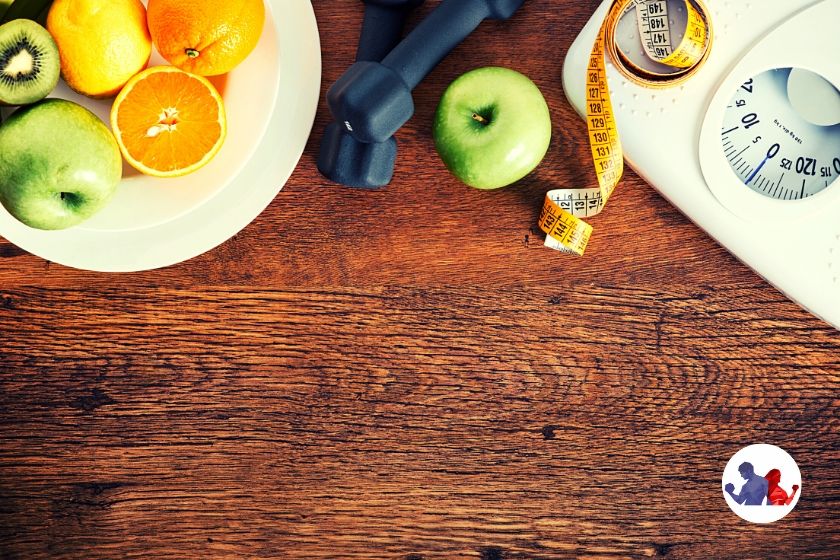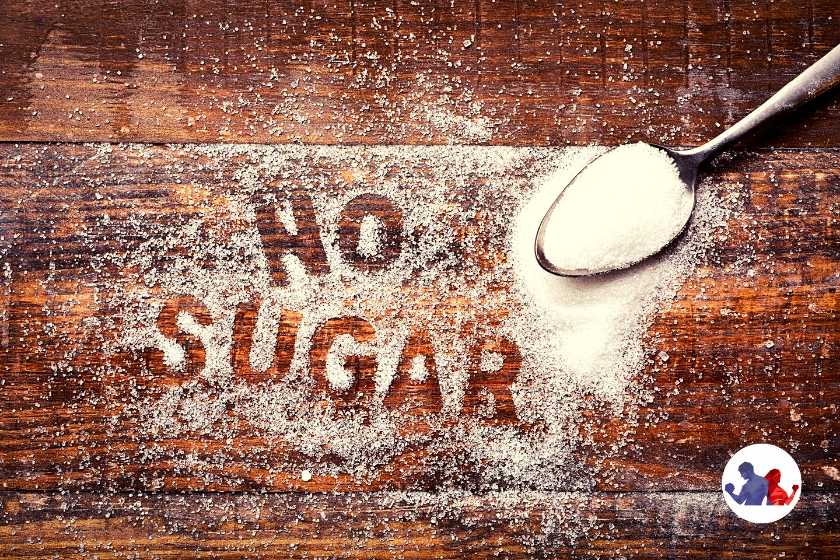We’ve likely all come across fat loss articles that promote the latest fat loss diet or method. Unfortunately, many of these are nothing more than fads and pseudoscience.
However, due to the raft of fat loss information online, it can be challenging to differentiate the fact from the fiction.
Therefore, this article will provide twenty scientific-backed tips that have been found to facilitate fat loss.
Table of Contents
20 Science-Backed Fat Loss Tips You Need to Try Today
1. Count Calories
When it comes to weight loss, calories are of utmost importance. To cause a significant reduction in body fat, a calorie deficit must be established and maintained.
This is simply where calories burned are greater than calories consumed. As a result of this deficit, stored body fat will be broken down to provide the body with energy.
Counting our daily calorie intake will ensure that we are consuming the correct quantity of calories to cause fat loss. This can be done through journals, online trackers, and apps.
One study found that those who frequently track their food intake are likely to achieve greater success with fat loss (1).
2. Reduce Portion Sizes
Another method of significantly reducing calorie intake is to reduce portion sizes. By consuming less food, the number of calories consumed will drop.
It does not have to be a drastic reduction in portion size either. A small reduction with each meal of the day can contribute to a large calorie deficit.
A simple way of reducing portion sizes is to use smaller plates. Results from one study showed that, by using smaller plates, participants consumed fewer calories (2).
3. Consider Intermittent Fasting
Intermittent fasting (IF) is a commonly used method for cutting calories. As the name suggests, it involves periods of eating and fasting.
There are many IF methods with the 16/8 method being one of the most popular. This method involves eating during an 8-hour window and fasting for the remaining 16 hours.
The purpose of restricting food intake in this manner is to prevent the overconsumption of calories and facilitate weight loss.
Research on intermittent fasting has indicated that it can effectively reduce calorie consumption and cause significant weight loss (3).
4. Eat A High-Protein Diet
Protein is best known for its role in growth and repair. However, it also has an impact on a number of appetite-regulating hormones.
Studies on high-protein consumption suggest that it can leave individuals feeling fuller for longer (4). Therefore, high protein diets are likely to reduce feelings of hunger.
In addition to this, protein is also needed to preserve muscle. As well as breaking down body fat, a calorie deficit may also cause the breakdown of muscle tissue.
Research has indicated that high-protein diets can effectively minimize muscle loss and facilitate fat loss (5).
5. Eat A High-Fiber Diet
Dietary fiber is an indigestible plant-based substance that is primarily required for aiding digestion. As with protein, fiber is highly satiating and enhances feelings of fullness.
By eating a high-fiber diet, we are likely to feel fuller throughout the day thus reducing the total amount of food consumed.
There are a vast number of studies that have found high-fiber diets to cause weight loss. Not only may high-fiber diets facilitate weight loss, they may also help to regulate weight (6).
In addition to facilitating weight loss, high-fiber diets may reduce blood pressure, lower blood sugar levels, and promote heart health (7).
6. Consume More Fruit and Veg

Leading on from the previous point, vegetables and fruits contain a large amount of fiber. In addition, they typically contain very few calories and an array of key micronutrients.
Therefore, it is possible to eat a large number of fruits and vegetables per day without significantly increasing calorie consumption.
By upping the amount of fruit and veg, it is likely that satiety levels will also increase. This will enhance feelings of fullness and is likely to reduce the risk of calorie overconsumption
It is abundantly clear that consuming fruit and veg on a daily basis has a positive impact on health. Research has shown that those who regularly eat fruit and veg tend to weigh less (8).
7. Drink More Water
Keeping well hydrated is vastly important for the health of our bodies. Studies have indicated that water consumption can play a role in weight loss.
It has been suggested that drinking water regularly can boost our metabolism thus increasing calorie burn (9).
Furthermore, researchers have recommended consuming water prior to meals. This simple method has been found to reduce the number of calories consumed in the meal.
The results of this study also suggest that those who drank water before meals experienced a greater amount of weight loss (10).
8. Use Probiotics
Probiotics are live bacterias that are beneficial for the health of the body. They are particularly effective for improving digestive function and promoting gut health.
Be aware that there is a range of probiotic supplements available. It is recommended to use supplements containing bacteria from the Lactobacillus family.
Research on probiotics suggests that taking Lactobacillus probiotic supplements may contribute to the reduction of fat mass (11).
9. Consider Using Supplements
On the topic of supplements, there are a number of supplements available that may be beneficial for facilitating fat loss.
Supplements come in many forms such as powders and pills. When used appropriately, supplements provide a practical and effective way of enhancing our nutrition.
As highlighted, increasing the consumption of both protein and fiber can aid fat loss. Therefore, for those who struggle to get enough of either substance, supplements may help.
Vitamin supplements may also be beneficial for fat loss and general health, especially for those who are deficient (12).
10. Eat Mindfully
When eating quickly, it takes time for the brain to recognize that enough has been eaten. Therefore, eating more mindfully may prove to be beneficial for fat loss.
Research suggests that taking time over meals and chewing slowly can reduce the total number of calories consumed.
In addition, it has been linked with increasing the production of certain hormones that influence fat loss (13).
11. Hide Unhealthy Food and Keep Healthy Food Close
Something as simple as leaving food sitting on a kitchen countertop can influence our food choices.
One study found that keeping only a fruit bowl on the countertop caused a reduction in the participant’s BMI (14).
Based on these results, it is recommended that all unhealthy foods and snacks are put out of sight.
Keeping healthy foods visible may allow us to make healthier food choices and consequently keep our calorie intake low.
12. Reduce Sugar Intake

Many attribute weight gain to consuming too much sugar. While sugar is not the direct cause of fat gain, sugary foods contain a large number of calories.
Consuming too many sugary foods may lead to a calorie surplus which causes body fat to increase.
In addition, research has associated a high sugar consumption with an increased risk of obesity and chronic diseases (15).
Therefore, reducing the consumption of these foods will significantly reduce our total calorie intake and may lead to fat loss.
13. Cut Down On Alcohol
At seven calories per gram, alcohol contains a higher number of calories than most people realize. Therefore, regular alcohol consumption can substantially increase calorie intake.
In addition to this, studies suggest that alcohol inhibits fat burning and may contribute to obesity (16).
For those who do not wish to reduce their alcohol consumption, consider making wiser choices. For example, spirits tend to contain far fewer calories than beers, wines, and ciders.
14. Avoid Late Night Eating
Many believe that consuming food late at night causes weight gain and prevents weight loss. However, this is not the case as only total calorie intake dictates changes in weight.
That said, some research exists to suggest that those who eat late at night have an increased risk of obesity (17).
Eating late at night is associated more heavily with binge eating which may help to explain the findings of the study.
15. Set Realistic Goals
When it comes to making substantial progress with our health and fitness, setting realistic goals is recommended.
Not only do goals help to keep us on track they may also improve adherence, enjoyment, and motivation levels (18).
One weight loss study found that setting targets increased participants’ chances of being successful with weight loss (19).
16. Get Better Sleep
Poor sleep has been associated with an increased risk of obesity. This is mainly attributed to the fact that poor sleep quality appears to slow down our metabolism.
It also appears to impact a number of hormones that regulate our appetite. This can lead to an increase in hunger and may lead to overconsumption of calories.
Finally, poor sleep may also lead to the production of a stress hormone called cortisol. This hormone has been associated with increased fat storage (20).
Therefore, if our goal is fat loss, it is absolutely critical that sleep length and quality are a high priority.
- Related – Sleep and Weight Loss: Is There A Link?
17. Manage Stress Levels
As highlighted, cortisol is a hormone that is released when the body experiences stress. When under prolonged stress, cortisol may remain at an elevated level.
This can have a significant impact on another hormone called insulin. Insulin is needed to regulate blood sugar levels and for the utilization of carbs for energy.
Cortisol can reduce the body’s sensitivity to the effects of insulin consequently contributing towards higher blood sugar levels and fat storage.
Therefore, stress management may have a substantial impact on fat loss. One study found that working through a stress-management program led to a significant reduction in BMI (21).
18. Exercise More Regularly

Movement and exercise expend calories. Therefore, by increasing our exercise frequency a greater amount of calories will be burned thus contributing to a calorie deficit.
Making changes to our nutrition or exercise may be enough to bring about weight loss, However, for the most optimal changes, changes to both should be made (22).
In addition to fat loss, regular exercise can significantly boost health and reduce the risk of developing chronic diseases.
19. Perform More Cardio
Staying on the topic of exercise, there may be value found in performing cardio more frequently. This is due to the fact that cardio activities tend to burn a large number of calories.
Cardio comes in many forms including running, swimming, cycling, and rowing. Activities that place demands on the heart and lungs for a prolonged period can be considered cardio.
The conclusion from one study described cardio training as the most optimal exercise mode for reducing body fat (23).
20. Utilize Resistance Training
As reflected on, due to the calorie deficit, fat and muscle mass may be lost. While reducing body fat is beneficial, losing muscle size is something we want to avoid.
Resistance training can be employed to prevent the breakdown of muscle tissue. In addition to this, research indicates that lifting weights can boost the body’s metabolism (24).
Finally, protein intake is of high importance when partaking in resistance training. Optimal recovery and progress will not be attained if protein intake is inadequate.
Takeaway
There are a number of different approaches that can be taken to enhancing fat loss.
Nutritional changes can significantly reduce calorie intake to create the deficit that is required for weight loss.
Focusing on lifestyle alterations, such as improving sleep and managing stress levels, may also be beneficial.
Finally, there is a range of exercise modifications that can be made to increase calorie burn and enhance fat loss.
By applying a number of these scientifically-backed tips, it is possible to bring about a substantial reduction in body fat.
- https://www.ncbi.nlm.nih.gov/pmc/articles/PMC5568610/
- https://www.ncbi.nlm.nih.gov/pubmed/24341317
- https://www.ncbi.nlm.nih.gov/pmc/articles/PMC6128599/
- https://www.ncbi.nlm.nih.gov/pubmed/30597865
- https://www.ncbi.nlm.nih.gov/pubmed/19927027
- https://www.ncbi.nlm.nih.gov/pubmed/11396693
- https://www.ncbi.nlm.nih.gov/pubmed/19335713
- https://www.ncbi.nlm.nih.gov/pubmed/20633234
- https://www.ncbi.nlm.nih.gov/pubmed/14671205
- https://www.ncbi.nlm.nih.gov/pubmed/19661958
- https://www.ncbi.nlm.nih.gov/pubmed/28001147
- https://www.ncbi.nlm.nih.gov/pubmed/30246883
- https://www.ncbi.nlm.nih.gov/pubmed/19875483
- https://www.ncbi.nlm.nih.gov/pubmed/26481966
- https://www.ncbi.nlm.nih.gov/pubmed/15051594
- https://www.ncbi.nlm.nih.gov/pmc/articles/PMC4338356/
- https://www.ncbi.nlm.nih.gov/pmc/articles/PMC6421799/
- https://www.academia.edu/8012754/Effect_of_Goal_Setting_on_Motivation_and_Adherence_in_a_Six_Week_Exercise_Program
- https://www.ncbi.nlm.nih.gov/pmc/articles/PMC5111772/
- https://www.ncbi.nlm.nih.gov/pmc/articles/PMC2929498/
- https://www.ncbi.nlm.nih.gov/pmc/articles/PMC4996635/
- https://www.ncbi.nlm.nih.gov/books/NBK221839/
- https://www.ncbi.nlm.nih.gov/pmc/articles/PMC3544497/
- https://www.ncbi.nlm.nih.gov/pubmed/18356845
